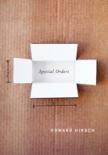His Life So Far
Edward Hirsch, president of the John Simon Guggenheim Memorial Foun-dation, has contributed mightily to our appreciation of poetry. How to Read a Poem and Fall in Love With Poetry (1999) discourses on all the aspects of poetry, drawing widely on what the poets themselves have had to say about it. Poet’s Choice (2006) is Hirsch at his best—130 chapters of two or three pages each, introducing poems from every corner of the world, with pithy comment. These pieces all appeared in his column in The Washington Post Book World. Their range is remarkable.
Hirsch has published six small collections of poetry prior to Special Orders. Wild Gratitude (1986), which received the National Book Critics’ Circle Award, includes some real classics, like “The Night Parade” and “Edward Hopper and the House by the Railroad (1925).” The title poem is an affecting tribute to the half-daft Christopher Smart (18th century) “and his grave prayers for the other lunatics,/ and his great love for his speckled cat, Jeoffry.”
The title poem of this present volume, “Special Orders,” tells of the diligence of Hirsch’s father as he worked for over 50 years in a box and paper company. Other poetic memoirs, many including his father, start off this slim volume. A few poems set in post-World War II Europe follow. In “Kraków, 6 A.M.,” the poet looks back at America as a “gangly teenager” still sprawling in sleep, while the Old World, “where poetry matters,” is waking up once more and off to work.
Hirsch loves to meditate on art works. He does so here in “Soutine: A Show of Still Lifes,” about an artist drawn to depict animal life bloody and splayed out. In “The Chardin Exhibition,” admiring more still lifes, the poet muses upon a friend lying at home elsewhere at that time “for a nap, one of your last.” He appreciates Chardin as defying death.
Edward Hirsch knows much about the variety of poetic forms. He has said, “Fresh or changing conditions ferment fresh forms.” However, the above poems fall into a kind of mold—three- or four-line stanzas that can be vivid but have the more relaxed and less tense pace of prose. The second half of the book is superior, perhaps because of its opener, “Late March,” the poet’s excited and half dreamy visit to a Manhattan pier to see off a “queenly ship…the passengers clustered at the rails on deck.” “Suddenly,” as the ship goes off, he writes, “a great cry went up.”
“Green Night” locates the poet at an artists’ camp in the Adirondacks in 1982. “It was a green night to be a poet in those days./ We didn’t care if the country didn’t care about us.” “Boy with a Headset” presents his teenage son, ahead of him, “weaving through traffic” on Broadway, “a wild fledgling,/ who tilts precariously on one wing.” And I favor two rhymed poems, “To Lethargy” and “As I Walked Home from the Hospital.” The latter takes place in mid-July, on a “scathing day/ when nothing could stop/ my relentless joy.”
All is not sunny, however, in this volume. In “More than Halfway,” the author, introspective and “halfway to the grave,” tells us “God is an absence whispering in the leaves.” “Green Couch,” about a stuffed chair that he has hauled around the country, reminds him of all the books he has read in it. Some are about “the reasons for Reason, Being and Nothingness,/ existential dread and the death of God,” which makes him comment, “I’m still angry at Him for no longer existing.” In the final poem, “After a Long Insomniac Night,” more sanguinely, the poet goes down to the shore, swims out, “and my soul floated over the whitecapped waves.”
A poem is a cake that has to rise. Sometimes it doesn’t; but often, thank God, as here, it does.
This article also appeared in print, under the headline “His Life So Far,” in the May 12, 2008, issue.








